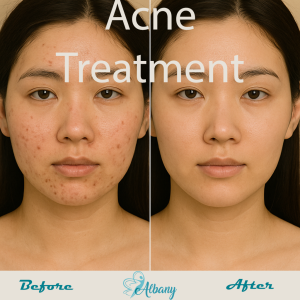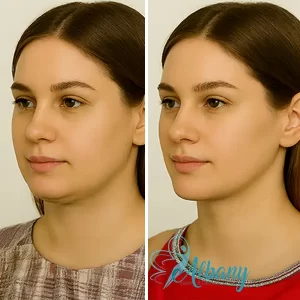Acne Types in Edmonton: Understanding Your Breakouts, Treatments and More
Not all acne is the same. From tiny blackheads on the nose to painful cysts under the skin, different forms of acne have distinct causes and respond to specific treatments. Knowing which type of acne you’re dealing with helps you and your dermatologist design an effective, targeted plan and avoid worsening breakouts with the wrong products. On this page, we explore the various types of acne, how they develop and the treatment options available at Albany Cosmetic & Laser Centre.
Combining Acne‑Type Treatment with Other Services
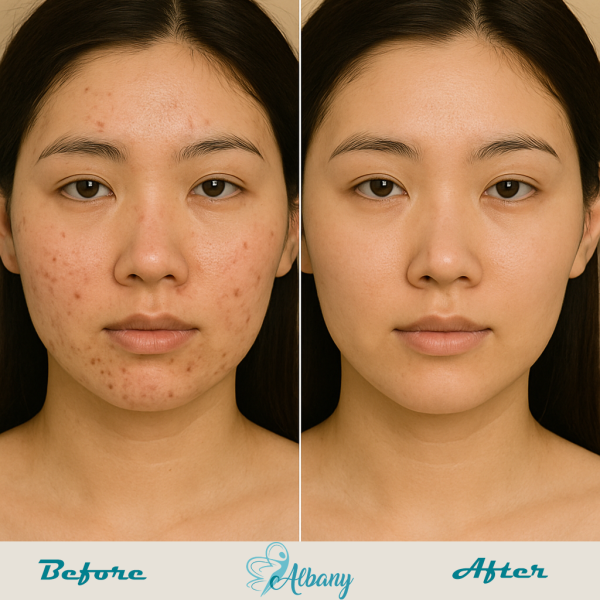
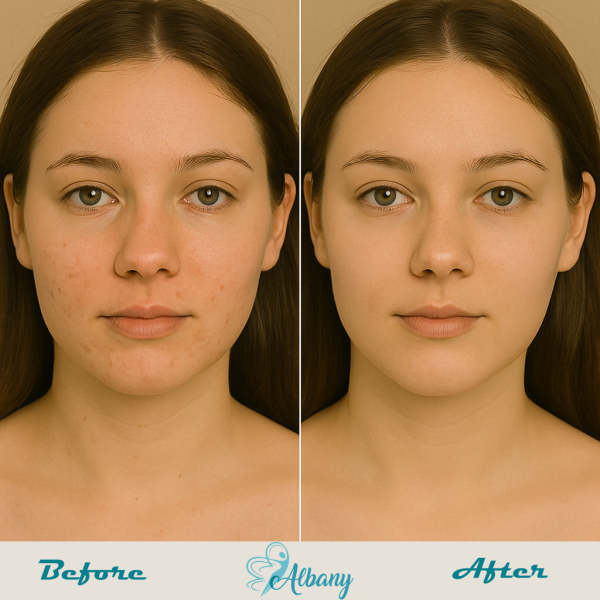
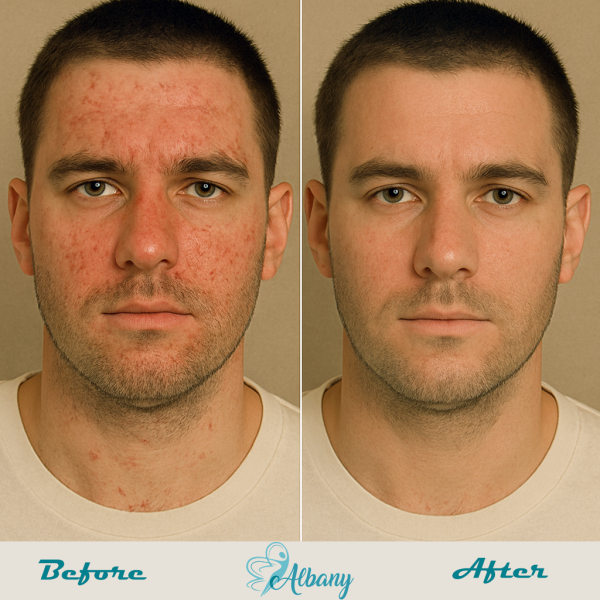
Once your acne type is identified and under control, complementary procedures can address residual issues like scarring and uneven texture:
- Microneedling and fractional lasers: Stimulate collagen to smooth acne scars and improve skin texture.
- Dermal fillers: Lift rolling or atrophic scars and restore lost volume.
- Hydrafacial: Combines cleansing, exfoliation and hydration to maintain healthy skin.
- Advanced skincare: Medical‑grade serums and targeted treatments for hyperpigmentation or redness.
We’ll recommend an appropriate timeline for combining these services once active acne is managed.
Here’s a practical overview of pricing, comfort, how the technology works, and what you should do to protect your results between sessions.
What Are the Different Types of Acne?
Acne is an umbrella term for several kinds of blemishes that form when pores become clogged or inflamed. Dermatologists broadly categorize acne into non‑inflammatory and inflammatory lesions, but there are additional subtypes and special cases. Each type has unique characteristics and may require a tailored approach.
Non‑Inflammatory Acne
Also called comedonal acne, non‑inflammatory breakouts involve clogged pores without significant redness or swelling.
- Blackheads (open comedones): These tiny dark spots form when a clogged pore remains open at the surface. The colour comes from oxidation of the pore’s contents, not dirt.
- Whiteheads (closed comedones): Whiteheads occur when the pore opening closes, trapping oil and dead skin under a thin layer of skin. They appear as small white or flesh‑coloured bumps.
Non‑inflammatory acne is often mild and responds well to topical exfoliants like salicylic acid, retinoids and gentle extractions.
Inflammatory Acne
Inflammatory lesions develop when bacteria proliferate inside clogged pores, triggering swelling, redness and sometimes pain.
- Papules: Small, firm, pink bumps that are tender to the touch. They result from inflammation in the pore.
- Pustules: Similar to papules but topped with a white or yellow center filled with pus. They are often referred to as “pimples.”
- Nodules: Large, solid lumps beneath the skin’s surface. Nodules are painful and can linger for weeks or months.
- Cysts: Deep, pus‑filled lumps that can be very painful. Cystic acne often results in scarring and may require medical intervention.
Inflammatory acne typically requires a combination of topical and oral medications, such as antibiotics, retinoids or hormonal therapy. Severe nodulocystic cases may benefit from intralesional steroid injections or isotretinoin.
Special Categories and Causes
Beyond the basic lesion types, certain conditions and triggers give rise to unique forms of acne:
- Hormonal acne: Breakouts linked to hormonal fluctuations, commonly appearing along the jawline, chin and neck. They often flare before menstruation or during puberty and pregnancy. Treatments may include hormonal birth control, spironolactone or isotretinoin.
- Acne mechanica: Caused by friction, heat and pressure from clothing, sports equipment or masks. It’s common in athletes and healthcare workers. Preventive measures include wearing breathable fabrics and using barrier creams.
- Acne cosmetica: Triggered by pore‑clogging makeup, skincare or hair products. Switching to non‑comedogenic products typically resolves the issue.
- Fungal acne (Malassezia folliculitis): Caused by an overgrowth of yeast rather than bacteria. The bumps are uniform in size, often itchy and appear on the chest, back and shoulders. Antifungal treatments, not standard acne therapies, are needed.
- Severe forms: Rare types like acne conglobata and acne fulminans present with widespread nodules, cysts and systemic symptoms. They require immediate medical attention and systemic therapy.
Benefits of Identifying Your Acne Type
Targeted Treatments
Knowing whether your breakouts are comedonal, inflammatory or hormonal allows your dermatologist to prescribe the most effective therapies, avoiding unnecessary medications or products.
Faster Results
Correctly identifying your acne type helps you see improvements sooner because treatments are tailored to the underlying cause rather than applied by trial and error.
Reduced Risk of Scarring
Severe acne types, especially nodules and cysts, can lead to permanent scars if not treated promptly. Recognising and treating these lesions early minimises long‑term damage.
Improved Confidence
Understanding your skin and seeing progress under a professional’s care can boost your self‑esteem and encourage adherence to your regimen.
Why Choose Albany Cosmetic & Laser Centre for Acne Type Diagnosis?
Our clinic combines clinical expertise with advanced diagnostic tools to analyse your skin and determine the exact type of acne you’re experiencing. Reasons to trust us include:
- Comprehensive Evaluation: We perform a thorough skin examination, taking into account your medical history, lifestyle and hormonal factors.
- Customised Plans: We design treatment strategies tailored to each acne type, severity level and your personal goals.
- Integrated Therapies: Our facility offers prescription management, extractions, chemical peels, phototherapy and laser treatments all in one place.
- Ongoing Support: We monitor your progress, adjust your regimen and provide education on skincare, diet and stress management.
- Transparent Pricing: You receive clear cost estimates and can choose from package options for multiple sessions.
Transparent Pricing
Because acne management varies widely, costs differ depending on your acne type and treatment plan. Minor non‑inflammatory breakouts may require affordable over‑the‑counter products, while treating severe cystic or hormonal acne might involve several office procedures and medications. A detailed quote will be provided during your consultation, and we can discuss financing or membership programs to help manage expenses.
The Acne Type Assessment Process at Albany Laser in Edmonton
Preparing for Your Consultation
Bring a list of current skincare products, medications and a brief history of your acne. Avoid wearing heavy makeup so we can clearly assess your skin. Write down any triggers you’ve noticed—such as stress, diet or menstrual cycles—to discuss with your provider.
What to Expect During Your Visit
During your appointment, we will examine your skin under magnification and may perform sebum or hydration measurements. Based on our findings, we’ll identify the types of lesions present (comedones, papules, pustules, nodules, cysts or special forms). We’ll explain the causes and recommend treatment options tailored to your needs.
Aftercare and Follow‑Up
Once your treatment plan is in place:
- Follow your regimen: Use prescribed products as directed and take oral medications at the same time each day.
- Modify triggers: Adjust lifestyle factors—such as diet, stress and cosmetics—that contribute to your acne type.
- Gentle care: Cleanse twice daily, moisturise appropriately and always protect your skin with sunscreen.
- Attend follow‑ups: Regular visits allow us to monitor progress, adjust treatments and address any side effects or new breakouts.
- Be patient: It takes time to see improvement, particularly for hormonal or cystic acne. Sticking with your regimen is key.
Frequently Asked Questions
- How do blackheads differ from whiteheads?
- Blackheads form when the pore stays open and the plug oxidises, turning dark. Whiteheads occur when the follicle opening closes over the plug, keeping it white or skin‑coloured.
- Can I remove blackheads myself?
- It’s best to avoid squeezing or picking at blackheads. Improper techniques can cause inflammation or scarring. Professional extractions are safer and more effective.
- How soon will I see results?
- Consistency is key. Many clients notice smoother skin within 2–4 weeks of using salicylic acid or retinoids. Professional treatments can produce quicker results.
- Are there specific ingredients to look for in products?
- Look for salicylic acid, glycolic acid, lactic acid, retinoids and benzoyl peroxide, and choose products labelled “non‑comedogenic.”
- Does diet impact blackheads?
- Some people find that high‑sugar or high‑dairy diets increase oiliness and breakouts. Eating a balanced diet, managing stress and staying hydrated may help improve skin clarity.
- Do pore strips really work?
- Pore strips can remove the tops of blackheads temporarily but don’t address deeper buildup or prevent new comedones. Regular exfoliation and professional care are more effective.
- How often should I schedule professional extractions?
- It depends on your skin. Many people benefit from professional extractions every 4–6 weeks, combined with consistent at‑home care.
- Can I wear makeup if I have blackheads?
- Yes—choose oil‑free, non‑comedogenic products and remove them thoroughly every night to prevent new clogs.
- What if my skin becomes dry or irritated?
- Mild dryness or peeling can occur when starting exfoliants or retinoids. Use a gentle moisturiser, reduce application frequency and consult your provider if irritation persists.
- When should I see a dermatologist?
- If over‑the‑counter treatments don’t help after several weeks or if blackheads are accompanied by painful pimples or scarring, it’s time to seek professional guidance.
Request Your Appointment Today
Professional evaluation benefits anyone who:
- Has persistent or severe breakouts that don’t respond to over‑the‑counter products.
- Experiences painful nodules, cysts or widespread inflammation.
- Develops acne in adulthood or around hormonal changes.
- Is worried about scarring or post‑inflammatory hyperpigmentation.
- Suspects an unusual form of acne (such as fungal acne or acne mechanica).
If you are pregnant, have underlying medical conditions or are taking medications that influence hormone levels, let your dermatologist know so treatments can be safely tailored.
Read our privacy policy here
